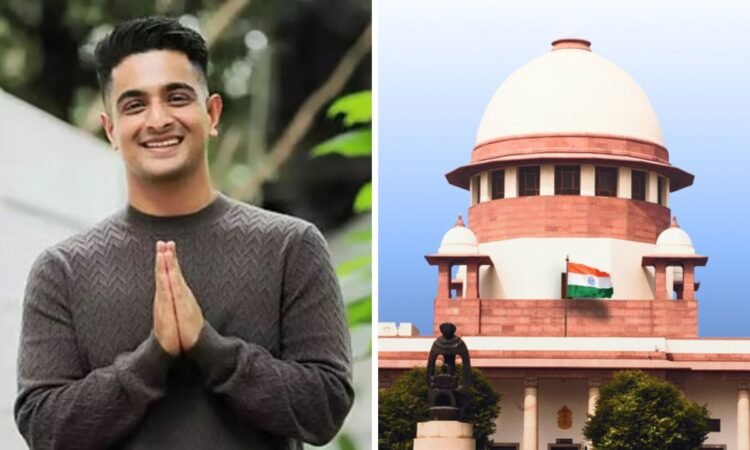Podcaster Ranveer Allahbadia gets a fresh start with conditions to ensure content remains within moral guidelines. Here’s how the ruling shapes digital content creation in India.
NEW DELHI (India CSR): In a landmark ruling, the Supreme Court of India has granted popular podcaster and YouTuber Ranveer Allahbadia permission to resume his widely followed podcast, The Ranveer Show. However, the decision comes with a critical caveat—his content must align with societal standards of decency and morality. This ruling follows a temporary suspension of the show after a controversial remark sparked public outrage, igniting a nationwide debate on digital content responsibility.
The case has brought to light pressing questions about the fine line between creative freedom and ethical content creation in India’s evolving digital landscape. While many hail the verdict as a victory for free speech, others see it as a necessary step toward accountability in online media. As Allahbadia prepares to return to the mic, all eyes are on how this ruling will reshape the future of content creation in India.
The Supreme Court Lifts the Ban, but with Conditions
In a significant decision, the Supreme Court of India has granted Ranveer Allahbadia permission to resume his popular podcast, The Ranveer Show. However, the verdict comes with a key stipulation: the content must adhere to social and moral decency standards.
The ruling follows a temporary suspension of the show after a controversial remark made by Allahbadia on another YouTube platform ignited public outrage. The decision has sparked a renewed discussion on the fine balance between creative freedom and responsible content creation in India’s rapidly evolving digital landscape.
What Led to the Ban?
The controversy began when Ranveer Allahbadia appeared as a guest on the YouTube show India’s Got Latent, hosted by comedian Samay Raina. During the episode, Allahbadia posed an unsettling question to a contestant:
“Would you rather watch your parents… or join in once and stop it forever?”
This remark was deemed highly inappropriate by viewers, leading to severe backlash. Social media exploded with criticism, and complaints were filed against Allahbadia, Raina, and others involved in the show.
Following the outrage, the Supreme Court intervened, temporarily halting The Ranveer Show until further review. The case raised pressing concerns about the ethical responsibilities of content creators, the boundaries of humor, and the role of regulatory oversight in digital media.
The Supreme Court’s Verdict
On Monday, the Supreme Court ruled in favor of lifting the ban, allowing Allahbadia to continue his podcast. However, the bench made it clear that freedom of speech, while fundamental, is not absolute and must align with societal norms.
The court stated:
“As of now, petitioners were restrained from airing any shows. Subject to the petitioner furnishing an undertaking that his podcast shows will maintain the desired standards of morality and decency so that viewers of any age group can watch, the petitioner is permitted to resume The Ranveer Show.”
Additionally, the court emphasized that while creative freedom is essential, digital content must be produced responsibly, considering the cultural sensitivities of a diverse audience.
A New Era of Content Regulation?
The ruling has intensified discussions about the future of digital content regulation in India. While India has laws governing mainstream media, the digital content space remains largely self-regulated. The Supreme Court hinted at the need for clear, well-defined policies that ensure a balance between creative expression and public decency.
Solicitor General Tushar Mehta, representing the government, commented on the issue, stating:
“The problem is not with humor or vulgarity but with perversion. There is a difference, and creators must recognize that boundary.”
Experts believe this ruling could set a precedent for future content moderation policies, particularly in an era where digital platforms have immense influence over public discourse.
What This Means for Content Creators
For digital creators, this ruling serves as a reminder that their work carries significant social responsibility. With The Ranveer Show employing over 280 people, Allahbadia’s case highlights the broader economic implications of content regulation.
Going forward, content creators may need to implement:
- Stricter self-regulation: Ensuring content aligns with ethical and social norms.
- Pre-screening processes: Reviewing scripts and discussions before publishing.
- Audience consideration: Keeping in mind the diverse demographics of Indian viewers.
While many creators welcome guidelines that ensure responsible storytelling, others fear that excessive restrictions might curb artistic expression and innovation in digital media.
Public Reactions and Industry Perspectives
The Supreme Court’s decision has drawn mixed reactions from various quarters.
- Supporters of the verdict argue that this is a necessary step to maintain ethical content standards in a rapidly growing digital space. They believe that while free speech is essential, it must be exercised with responsibility.
- Critics of the ruling worry that imposing content restrictions may lead to censorship, limiting the creative freedom of content creators.
Meanwhile, the digital media industry is awaiting clarity on whether formal regulations will be introduced following the court’s suggestions.
The Road Ahead: Content Creation with Caution
Ranveer Allahbadia’s case serves as a watershed moment for India’s digital content landscape. With his podcast now set to resume, all eyes will be on how he navigates these new moral and ethical expectations.
This ruling has raised fundamental questions:
- Will content creators now be more cautious in their storytelling?
- Could this be the beginning of a structured content regulation policy for digital media?
- How will platforms like YouTube adapt to these evolving expectations?
As India’s digital ecosystem continues to expand, content creators, regulators, and audiences must work together to ensure a balance between free expression and responsible storytelling.
(India CSR)























